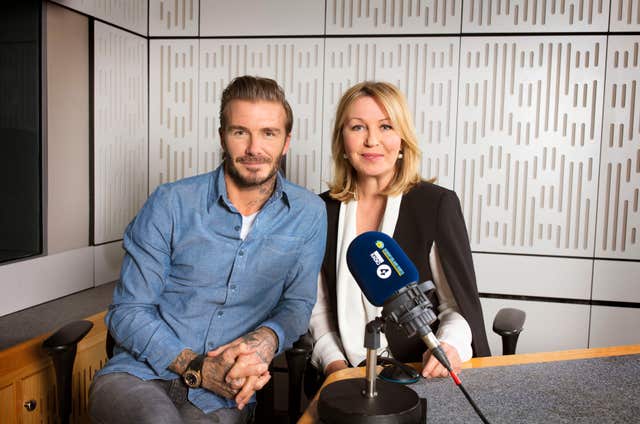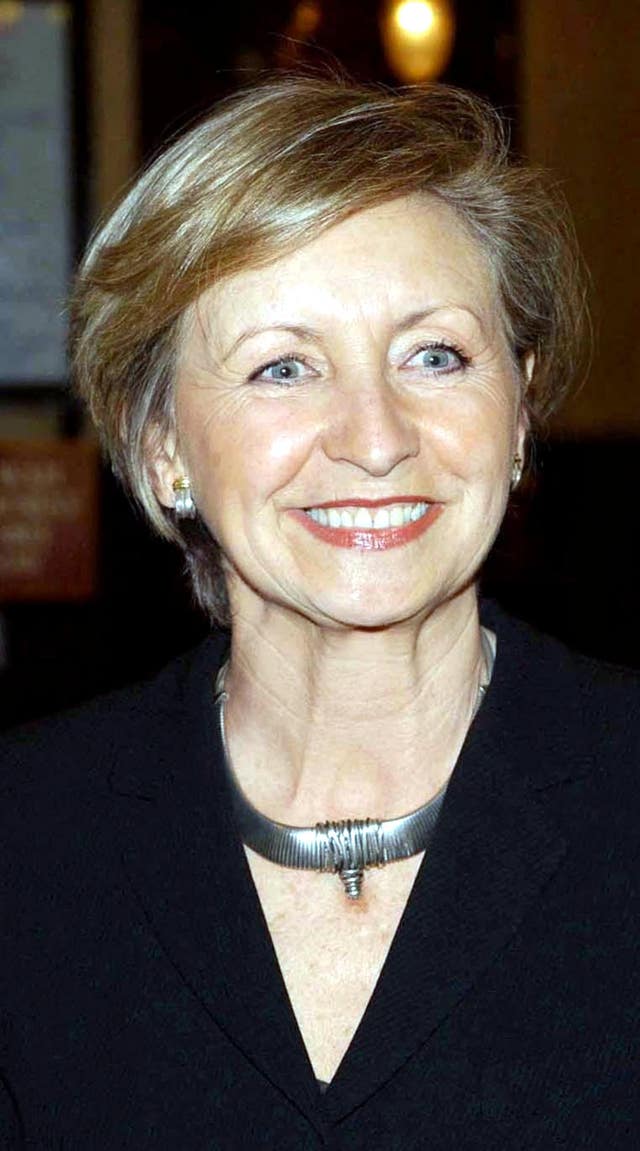
Kirsty Young has stepped down permanently as host of Desert Island Discs, saying her break from the radio show has inspired her to “pursue new challenges”.
The broadcaster first presented the castaway programme 12 years ago but had a spell away from it last summer after being diagnosed with a form of fibromyalgia.
The 50-year-old has now announced that she will not be returning to the long-running BBC Radio 4 show.
READ MORE: Desert Island Discs presenter Kirsty Young takes a break due to illness
The former Five News anchor said she is “now well on the way to feeling much better” but that being away from the airwaves changed her “perspective”.
 Kirsty Young with David Beckham (Sophie Mutevelian/BBC)
Kirsty Young with David Beckham (Sophie Mutevelian/BBC)
The BBC said no longer-term decisions have been made about the host but that it is “delighted” that Lauren Laverne, who has been filling in for Young, will continue to present the popular programme.
Young said: “After 12 incredibly happy and fulfilling years on Desert Island Discs I’ve decided to step down permanently.
“Having been forced to take some months away from my favourite job because of health problems, I’m happy to say I’m now well on the way to feeling much better.
“But that enforced absence from the show has altered my perspective on what I should do next and so I’ve decided it’s time to pursue new challenges.
Kirsty Young has decided to step down permanently as host of @BBCRadio4’s #DesertIslandDiscs: https://t.co/237n7ZbCa9 pic.twitter.com/rsliS2evaY
— BBC Press Office (@bbcpress) July 5, 2019
“Having hundreds of Castaways share their triumphs, tragedies, tribulations and tracks with me over the years was a huge privilege and an education. I am so thankful to (creator) Roy Plomley for the brilliance of his format, and I wish the programme and Lauren all the very best.”
Young took over from Sue Lawley as the host of Desert Island Discs in 2006 and was praised for her style on the show, in which guests share their favourite music while talking about their life.
READ MORE: SNP lodge an official complaint to Ofcom over Jeremy Vine show
She presented 496 episodes as well as fronting its 70th and 75th anniversary celebrations.
Her castaway guests have included Zadie Smith, David Beckham, Bruce Springsteen, Victoria Wood, Dame Kelly Holmes, Dame Judi Dench, George Michael, Alice Walker, Tom Hanks, Second World War pilot Eric Winkle Brown and Sir David Attenborough.
Kirsty has always been a hero of mine. I’d like to thank her and wish her the very best in her next chapter. To take care of my favourite programme has been an enormous honour and her encouragement has been invaluable. Her D.I.D. archive will remain a joy and a masterclass. https://t.co/1Ht6IpBTUb
— Lauren Laverne (@laurenlaverne) July 5, 2019
Fibromyalgia, also called fibromyalgia syndrome (FMS), is a long-term condition that causes pain all over the body, according to the NHS.
As well as widespread pain, people with fibromyalgia may also experience increased sensitivity to pain, fatigue, muscle stiffness and headaches.
 Lauren Laverne (Ian West/PA)
Lauren Laverne (Ian West/PA)
Desert Island Discs was the creation of Plomley – the idea came to him while he was at home and in his pyjamas.
The first broadcast was recorded in the BBC’s bomb-damaged Maida Vale studio on January 27 1942 and aired in the Forces Programme at 8pm two days later.
It was later presented by Sir Michael Parkinson, and Lawley became the first female host.
 Sue Lawley previously presented Desert Island Discs (PA)
Sue Lawley previously presented Desert Island Discs (PA)
BBC director of radio and education James Purnell said: “Kirsty has been a wonderful host of Desert Island Discs for more than a decade and her intuitive interviewing style as well as her warmth and humour has helped bring out incredible life stories and anecdotes from her castaways. We know how loved she is by listeners and we all wish her well for the future.
“Lauren Laverne has been doing a brilliant job at the helm in Kirsty’s absence and I’m delighted she continues to host one of Radio 4’s most popular shows.”
BBC Radio 6 Music host Laverne, 41, said: “Stepping in for Kirsty on Desert Island Discs (which was already my favourite programme) has been an enormous honour. I wish her the very best in her next chapter.”



Why are you making commenting on The Herald only available to subscribers?
It should have been a safe space for informed debate, somewhere for readers to discuss issues around the biggest stories of the day, but all too often the below the line comments on most websites have become bogged down by off-topic discussions and abuse.
heraldscotland.com is tackling this problem by allowing only subscribers to comment.
We are doing this to improve the experience for our loyal readers and we believe it will reduce the ability of trolls and troublemakers, who occasionally find their way onto our site, to abuse our journalists and readers. We also hope it will help the comments section fulfil its promise as a part of Scotland's conversation with itself.
We are lucky at The Herald. We are read by an informed, educated readership who can add their knowledge and insights to our stories.
That is invaluable.
We are making the subscriber-only change to support our valued readers, who tell us they don't want the site cluttered up with irrelevant comments, untruths and abuse.
In the past, the journalist’s job was to collect and distribute information to the audience. Technology means that readers can shape a discussion. We look forward to hearing from you on heraldscotland.com
Comments & Moderation
Readers’ comments: You are personally liable for the content of any comments you upload to this website, so please act responsibly. We do not pre-moderate or monitor readers’ comments appearing on our websites, but we do post-moderate in response to complaints we receive or otherwise when a potential problem comes to our attention. You can make a complaint by using the ‘report this post’ link . We may then apply our discretion under the user terms to amend or delete comments.
Post moderation is undertaken full-time 9am-6pm on weekdays, and on a part-time basis outwith those hours.
Read the rules hereComments are closed on this article